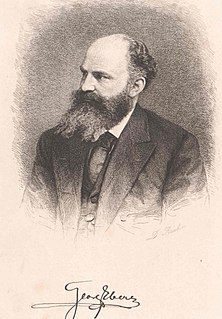A Quote by Georg Ebers
Christianity had ceased to be the creed of the poor. He spoke with pompous exaggeration. Whether man were the best or the worst of created beings.
Related Quotes
O, Times! O, Manners! It is my opinion That you are changing sadly your dominion I mean the reign of manners hath long ceased, For men have none at all, or bad at least; And as for times, altho' 'tis said by many The "good old times" were far the worst of any, Of which sound Doctrine I believe each tittle Yet still I think these worst a little. I've been a thinking -isn't that the phrase?- I like your Yankee words and Yankee ways - I've been a thinking, whether it were best To Take things seriously, Or all in jest
Because by now Elinor had understood this, too: A longing for books was nothing compared with what you could feel for human beings. The books told you about that feeling. The books spoke of love, and it was wonderful to listen to them, but they were no substitute for love itself. They couldn't kiss her like Meggie, they couldn't hug her like Resa, they couldn't laugh like Mortimer. Poor books, poor Elinor.
Not only were the Jews expecting the birth of a Great King, a Wise Man and a Saviour, but Plato and Socrates also spoke of the Logos and of the Universal Wise Man 'yet to come'. Confucius spoke of 'the Saint'; the Sibyls, of a 'Universal King'; the Greek dramatist, of a saviour and redeemer to unloose man from the 'primal eldest curse'. All these were on the Gentile side of the expectation. What separates Christ from all men is that first He was expected; even the Gentiles had a longing for a deliverer, or redeemer. This fact alone distinguishes Him from all other religious leaders.
Exaggeration! was ever any virtue attributed to a man without exaggeration? was ever any vice, without infinite exaggeration? Do we not exaggerate ourselves to ourselves, or do we recognize ourselves for the actual men we are? Are we not all great men? Yet what are we actually, to speak of? We live by exaggeration.
The Church was resolved to have a New Testament, and as, after the lapse of more than three hundred years, no handwriting could be proved or disproved, the Church, which like former impostors had then gotten possession of the State, had everything its own way. It invented creeds, such as that called the Apostle's Creed, the Nicean Creed, the Athanasian Creed, and out of the loads of rubbish that were presented it voted four to be Gospels, and others to be Epistles, as we now find them arranged.
A life without pain: it was the very thing I had dreamed of for years, but now that I had it, I couldn’t find a place for myself within it. A clear gap separated me from it, and this caused me great confusion. I felt as if I were not anchored to this world - this world that I had hated so passionately until then; this world that I had continued to revile for its unfairness and injustice; this world where at least I knew who I was. Now the world ceased to be the world, and I had ceased to be me.
I've had lots of discussions with my Muslim brothers and sisters who have said to me, "Christianity is a white man's religion" But I'm like, "how is that possible when Christianity went into Africa before it ever went into central Europe?" Even the first people to become a Christian nation were not Romans, they weren't the Byzantines either, they weren't the Greeks... the first people to claim a Christian empire were the Armenians.







































